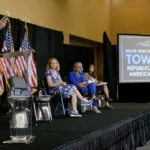Budget Battles Begin as Wyoming GOP Leaders Pan Biden’s Proposal: ‘Dead on Arrival’
The president’s 2024 budget calls for increasing taxes on wealthy Americans and corporations to fund new spending and reduce the federal deficit
- Published In: Politics
- Last Updated: Mar 13, 2023
In a speech to union workers and other supporters in Philadelphia on Thursday, President Joe Biden laid out his $6.8 trillion budget request for fiscal year 2024, which includes new tax hikes on wealthy Americans to fund spending priorities and deficit reduction. (Photo by Kyle Mazza/NurPhoto via AP)
By Jacob Gardenswartz
Special to the Wyoming Truth
WASHINGTON — For much of contemporary American political history, the annual machinations around government budgeting have followed a similar trajectory: the president would release his proposal, accompanied by a press conference or background briefing for reporters; congressional lawmakers in his party would praise it, while those across the aisle would rip it to shreds; and the ultimate federal allocation would end up somewhere in the middle, emerging through a compromise.
President Joe Biden’s $6.8 trillion budget released last week — his first such proposal which must clear a divided Congress — turns many of those traditions on their head. For one thing, the president traveled to Pennsylvania to deliver a campaign-like speech outlining his budget priorities, a decision the White House has defended as routine but which nonetheless continues to fuel speculation that an announcement pertaining to his 2024 candidacy may be on the horizon.
In his remarks, Biden sought to move away from the typical backdoor manner of federal appropriations, instead describing his proposal as a statement of his administration’s “values” and daring Republicans to go public with their response.
“I’m ready to meet with the Speaker anytime — tomorrow, if he has his budget,” Biden said Thursday to an audience of supporters and union workers at the Finishing Trades Institute in Northeast Philadelphia. “Lay it down. Tell me what you want to do. I’ll show you what I want to do. See what we can agree on, what we don’t agree on.”
In reality, much of Biden’s 184-page proposal has little chance of becoming law. It calls for some $5 trillion in tax hikes on wealthy Americans and corporations over 10 years to fund investments in areas ranging from child care to education to climate mitigation. Though it includes nearly $3 trillion in reductions to the federal deficit during that time, Wyoming’s Republican leaders have been clear they have little interest in Biden’s offering.

“This president wants to raise taxes on hardworking families so he can fund his reckless, radical spending,” Sen. John Barrasso (R-Wyo.) said in a statement following Biden’s announcement. “President Biden’s bloated budget is dead on arrival.”
“Biden’s budget reveals his plan for America if he could wave a magic wand,” echoed Sen. Cynthia Lummis (R-Wyo.). “This isn’t just wrong. It’s economic malpractice.”
Tax more, or spend less?
The central debate over Biden’s plan boils down to whether and how to fund government spending increases. Leaders of both parties acknowledge that increasing spending without adding additional revenues will further balloon the federal deficit, projected to equal over 6% of the nation’s gross domestic product by 2033.
Democrats argue pairing new spending with revenue-raisers like higher taxes on the wealthy will bring about a fairer economic system. Republicans, meanwhile, oppose most tax increases of any kind, arguing the only way to reduce the deficit is to spend less on federal programs.
In his budget remarks, Biden painted the debate as one between “MAGA Republicans” who “refuse to raise a single penny in new taxes on the wealthiest people,” and those in his party who are advocating for a more level playing field. His proposal promises not to raise taxes on anyone making less than $400,000 a year.
“No billionaire should be paying a lower tax than somebody working as a schoolteacher or a firefighter or any of you in this room,” Biden said.
But Biden’s Republican opponents seem unphased by his critiques. Reacting to Biden’s budget, which she described as “pure fantasy,” Rep. Harriet Hageman (R-Wyo.) argued bluntly that “[w]e need to spend less, not tax more.”
“We cannot tax and spend our way to prosperity,” Lummis added.
Lots of disagreements, few areas for compromise
Several measures included in Biden’s budget proposal emerged as especially egregious to Wyoming lawmakers, particularly those pertaining to fossil fuels and cryptocurrency.
Biden’s budget calls for eliminating tax subsidies for oil and gas companies, claiming those industries raked in record profits last year while investing in stock buybacks over new production.
According to a White House fact sheet, removing those subsidies would amount to some $31 billion in savings, not to mention further incentivizing investments in renewable energy over fossil fuels. Hageman, however, decried that policy as “new taxes” on those companies, noting it will “fortunately never be passed.”
The White House budget proposal also calls for a new excise tax on electricity used for cryptocurrency digital asset mining, starting at 10% and phasing up to 30% over the next three years. Such a policy would negate the “negative environmental effects” of crypto mining’s high energy usage, the Treasury Department argued, while raising significant revenues to offset spending or deficit reduction.
But in a Senate Environment and Public Works Committee hearing examining a similar legislative proposal last week, Lummis — once dubbed Congress’s “Crypto Queen” — pushed back strongly. She argued Bitcoin mining should be treated no differently than other high energy use actions like electric vehicle charging.
“Is it Congress’ job to decide whether an energy use is worthwhile or not?” Lummis asked the witnesses.
One Biden proposal that could find some GOP support: increases in defense and border security. The president calls for $880 million more in funding for Customs and Border Protection, as well as $4.7 billion in a contingency fund to address changing migration patterns.
Amid the litany of critiques Biden’s budget has received, Republicans have stayed mum so far on that request.













